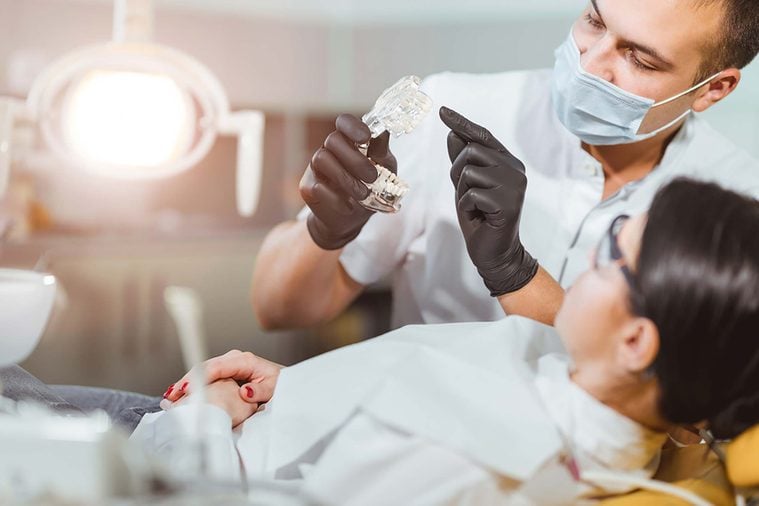If Your Dentist Prescribes Antibiotics, Ask These Questions First
Updated: May 07, 2021
You should never take antibiotics if they're not necessary—even if your dentist prescribes them.
 A little pain or discomfort is to be expected if you have a tooth extraction, filling, or other dental procedure. However, a lesser-known, unpleasant side effect—a serious one—has been revealed by research presented at IDWeek 2017, the annual meeting of the Infectious Diseases Society of America (IDSA), the Society for Healthcare Epidemiology of America (SHEA), the HIV Medicine Association (HIVMA), and the Pediatric Infectious Diseases Society (PIDS). According to the researchers, including lead author Stacy Holzbauer, DVM, MPH, dental procedure-related antibiotics may contribute to the growing problem of Clostridium difficile (C. diff), a serious and potentially deadly infection that causes severe diarrhea. (These home remedies for diarrhea might help.)
A little pain or discomfort is to be expected if you have a tooth extraction, filling, or other dental procedure. However, a lesser-known, unpleasant side effect—a serious one—has been revealed by research presented at IDWeek 2017, the annual meeting of the Infectious Diseases Society of America (IDSA), the Society for Healthcare Epidemiology of America (SHEA), the HIV Medicine Association (HIVMA), and the Pediatric Infectious Diseases Society (PIDS). According to the researchers, including lead author Stacy Holzbauer, DVM, MPH, dental procedure-related antibiotics may contribute to the growing problem of Clostridium difficile (C. diff), a serious and potentially deadly infection that causes severe diarrhea. (These home remedies for diarrhea might help.)
The Minnesota Department of Health (MDH) tracked community-associated c diff infections (those in patients who did not have an overnight stay in a hospital or nursing home) in five counties in the state, as reported on EurekAlert! During the six-year period, researchers determined 15 percent of those with the infection who had taken an antibiotic had them prescribed for dental procedures. They believe that many of them were unnecessarily prescribed, citing an earlier survey conducted by the MDH that found 36 percent of dentists prescribed an antibiotic in situations that are generally not recommended by the American Dental Association (ADA).
If you’re not sure when you do (and don’t) need antibiotics from your dentist, Golden, CO dentist Nancy Gill, DVM, has some advice. “If your dentist prescribes an antibiotic, you can ask a couple of questions to determine whether they are necessary, like, ‘Is there another medication that will help with inflammation and pain besides an antibiotic?’ and ‘Is an antibiotic the best medication for this?'” she says.
If you have sensitive teeth, sporadic pain, or tenderness when chewing, you definitely don’t need antibiotics. “If there is no swelling or draining pus, a corticosteroid called Medrol is often used,” says Dr. Gill. “It can decrease the inflammation, which is usually the reason for pain. Also alternating with Acetaminophen (Tylenol) and Ibuprofen every three to four hours gives the same pain relief as some prescription pain medications.”
However, if you have any of the above plus swelling, or if there is obvious swelling without these symptoms, or if there is a soft fluid-filled sac that contains pus, then antibiotics are necessary. “Facial cellulitis, periodontal abscess, Acute necrotizing ulcerative gingivitis, and pericoronitis are instances in which antibiotics are definitely required,” adds clinical dental hygienist Anastasia Turchetta. A high fever after a root canal is another sign you need antibiotics.
You can help your dentist by getting to grips with these dental health facts and also by knowing your own health history—and communicating that to your dentist, says Turchetta. If you’ve recently had surgery, have become immunocompromised, or are taking antibiotics for any other health condition, it’s crucial that you let your dentist know.